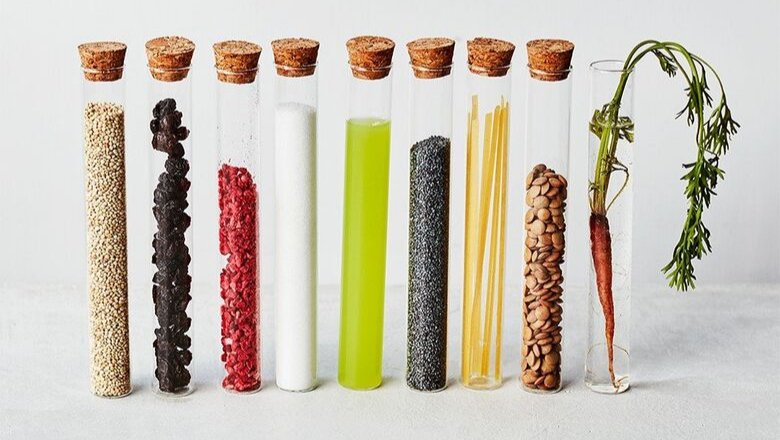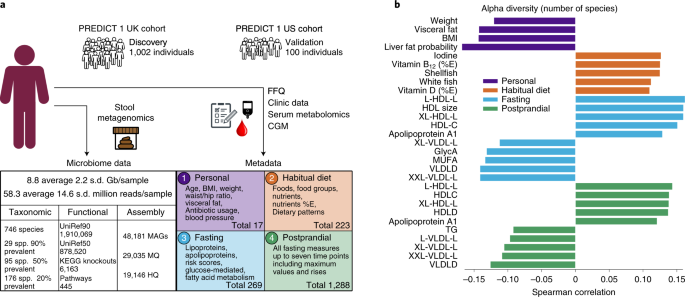Maiden Voyage
Gold™ Member
"Diets rich in healthy and plant-based foods encourages the presence of gut microbes that are linked to a lower risk of common illnesses including heart disease, research has found."

Landmark study reveals link between gut microbes, diet and illnesses
Diets rich in healthy and plant-based foods encourages the presence of gut microbes that are linked to a lower risk of common illnesses including heart disease, research has found.
www.kcl.ac.uk
A large-scale international study using metagenomics and blood chemical profiling has uncovered a panel of 15 gut microbes associated with lower risks of common conditions such as obesity and type 2 diabetes. The study has been published today in Nature Medicine from researchers at King's, Massachusetts General Hospital (MGH), Harvard T.H. Chan School of Public Health, the University of Trento, Italy, and health start-up company ZOE.
The PREDICT 1 (Personalized Responses to Dietary Composition Trial 1) analyzed detailed data on the composition of participants' gut microbiomes, their dietary habits, and cardiometabolic blood biomarkers. It uncovered strong links between a person's diet, the microbes in their gut (microbiome) and their health.
Researchers identified microbes that positively or negatively correlate 'good' and 'bad' with an individual's risk of certain serious conditions such as diabetes, heart disease and obesity. Surprisingly, the microbiome has a greater association to these markers than other factors, such as genetics. Some of the identified microbes are so novel that they have not yet been named.
The researchers defined a "healthy" diet as one that contained a mix of foods associated with a lower risk of chronic disease. They found that trial subjects who ate such a diet, or one rich in plants, were more likely to have high levels of specific 'good' gut microbes which are associated with a low risk of common illnesses. The researchers also found microbiome-based biomarkers of obesity as well as markers for cardiovascular disease and impaired glucose tolerance, which are key risk factors for COVID. These findings can be used to help create personalized eating plans designed specifically to improve one's health.
For example, the findings reveal that having a microbiome rich in Prevotella copri and Blastocystis species was associated with maintaining a favorable blood sugar level after a meal. Other species were linked to lower post-meal levels of blood fats and markers of inflammation.As a nutritional scientist, finding novel microbes that are linked to specific foods, as well as metabolic health, is exciting. Given the highly personalised composition of each individuals' microbiome, our research suggests that we may be able to modify our gut microbiome to optimize our health by choosing the best foods for our unique biology.– Dr. Sarah Berry, Reader in Nutrition Sciences at the School of Life Course Sciences
Professor Tim Spector, Epidemiologist from, who started the PREDICT study program and is scientific founder of ZOE, said: "When you eat, you're not just nourishing your body, you're feeding the trillions of microbes that live inside your gut."
Nicola Segata, PhD, professor and principal investigator of the Computational Metagenomics Lab at the University of Trento, Italy and leader of the microbiome analysis in the study, said: "We were surprised to see such large, clear groups of what we informally call 'good' and 'bad' microbes emerging from our analysis. It is also exciting to see that microbiologists know so little about many of these microbes that they are not even named yet. This is now a big area of focus for us, as we believe they may open new insights in the future into how we could use the gut microbiome as a modifiable target to improve human metabolism and health."
PREDICT is the largest in-depth nutritional study in the world. PREDICT 1 was an international collaboration to study links between diet, the microbiome, and biomarkers of cardiometabolic health. The researchers gathered microbiome sequence data, detailed long-term dietary information, and results of hundreds of cardiometabolic blood markers from just over 1,100 participants in the U.S. and the U.K. PREDICT 2 completed its primary investigations in 2020 with a further 1,000 U.S participants, and PREDICT 3 launched a few months ago.
Abstract here:

Microbiome connections with host metabolism and habitual diet from 1,098 deeply phenotyped individuals - Nature Medicine
Analyses from the gut microbiome of over 1,000 individuals from the PREDICT 1 study, for which detailed long-term diet information as well as hundreds of fasting and same-meal postprandial cardiometabolic blood marker measurements are available, unveil new associations between specific gut...






